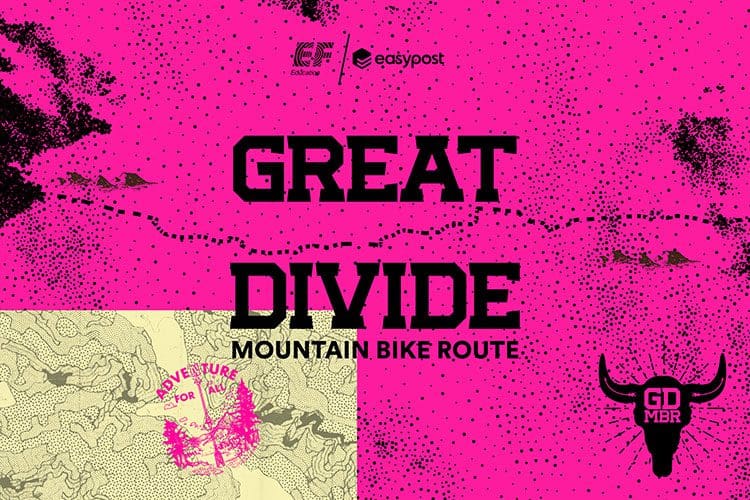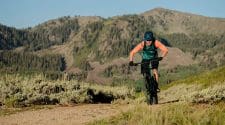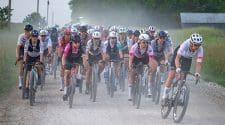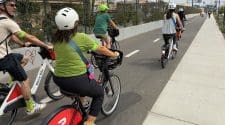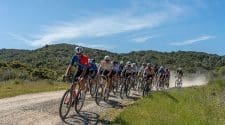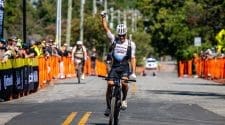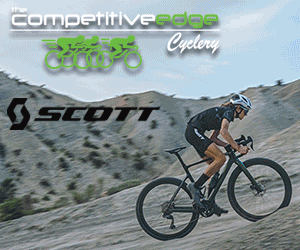It’s 100 miles to the next gas station, 100 miles from the last one. It’s 100 miles from anywhere, to anywhere. The Great Divide Mountain Bike Route, all 2,671 miles of it, is as beautiful as it is rugged, as ambitious as it is empty. And it’s what’s next for Lachlan Morton, starting August 29.
Beginning in Banff, Alberta, Canada and terminating in Antelope Wells, New Mexico, it’s the closest thing that bikepacking has to a Tour de France-level route. Think of it as 14 very long — very unsupported — stages, racing a clock that doesn’t stop. And that’s only if everything goes to plan, which it never does. The ride is an exploration of the North American West and of the self, mentally and physically. It’s the Alt Tour out West.
Morton is taking on the route in his own way, too. Rather than running on as little sleep as possible, as most long individual time trials and ultra-race efforts are executed, Lachlan plans to self-impose 12 hours of rest every 48 hours. But, in traditional ultra-racing format, the clock will never stop. Following the self-supported ethos, Lachlan will not accept outside support and will resupply only from publicly available stores on route. Broken wheel? Figure it out. Dark, cold and hungry, with no services for 75 miles? Best of luck.
The course record, or fastest known time (FKT), is held by the late ultracycling legend Mike Hall, who completed the ride in 13 days, 22 hours, and 51 minutes in 2016.
“It is going to be around two weeks, maybe more,” Morton said. “The Alt Tour was a similar duration but I think a challenge of this kind outweighs that because of the fact that you’re alone, and some stretches are so remote and wild that you are really kind of on your own out there.”
Along the way, dot-watchers, fans, and adventurers alike can donate to Adventure For All, a national non-profit organization that empowers individuals with exceptionalities (Down Syndrome, Autism, and other intellectual and developmental exceptionalities) through outdoor adventures to help them defy all current societal perceptions so they can embark on their own journey of endless potential.
To date, Morton’s fundraising efforts on the Colorado Trail, riding to the Ukraine border, and the Alt Tour have raised more than 1 million USD in donations. Recipients have included World Bike Relief (the Alt Tour, $713,000); the Ukraine Crisis Relief Fund ($300,986) and the family of Kenyan professional cyclist Sule Kangangi, a friend of Lachlan’s who died while riding in a race in the summer of 2022.
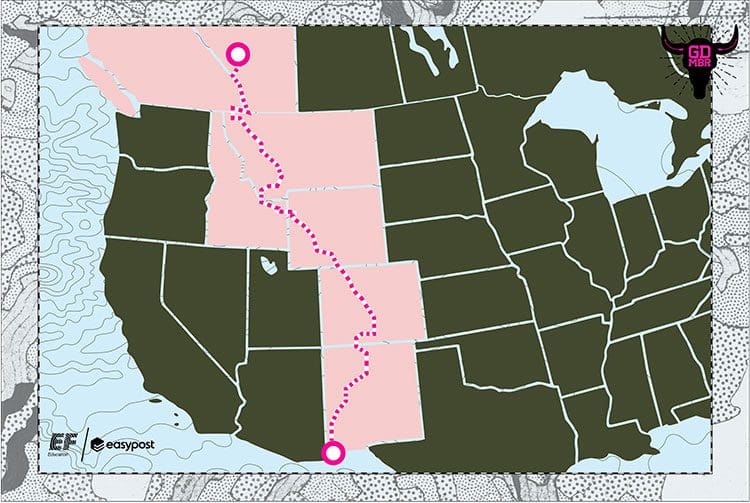
Lachlan’s Approach
Lachlan will stop to rest longer than he has in the past, imposing 12 hours of resting time every 48 hours. He landed on the 12/48 ratio to allow for the flexibility to pass through such remote, challenging terrain safely. Under ideal conditions Morton would stop for six hours every night, but he needs the flexibility to ride longer to make it to a hotel room or suitable campsite, which can mean pushing on a little longer.
He has considered tackling an ultra in such a way for several years now, as he seeks a more personally sustainable way to push his physical and mental limits.
After his efforts at the GBDuro, and on the Colorado Trail, Morton’s ultra ability and credentials are clear, but the experiment of resting and trying to make up time during the days as a result is a new challenge.
“I’ve done a few ultras now and they have all involved a fair bit of sleep deprivation in trying to go fast,” Morton said. “The last one I did was the Colorado Trail around this time last year. And I enjoyed that experience, but in the last kind of push I was pretty sleep deprived and wasn’t enjoying it and had that realization that ‘I don’t want to do this again.’
“I want to do this on a pretty good amount of sleep every night for a few reasons. The main one: I want to enjoy the riding, and it becomes increasingly difficult to enjoy what you are doing when you are running on minimal sleep, for me anyways, because you are not as present and aware. I don’t want to enter that space. Also just to be safe, I think that your decision-making and general awareness are pretty diminished if you are running on minimal sleep. I have never ridden this route before. It is a big undertaking, and to try and do all of that while pushing on minimal sleep, I think would be kind of reckless for me. But I still enjoy pushing big distances and mileage, so I am going to be — while I am riding — trying to cover as much distance as I can and trying to do it in a time that is as fast as I can while still sleeping.”
His time starts when he clips in in Banff and ends when — and of course if — he makes it to the US-Mexico Border at Antelope Wells, New Mexico. The approach mirrors some of the new ideas in place around ultra racing, such as the “stages” of the Evolution Gravel event in Tanzania, which Lachlan helped create.
“I am interested to see how much better I feel. I think the body is going to get the chance to regenerate and replenish a bit more, but also mentally, having that break from what you are doing, resetting and then tackling it again, I think will help in terms of having that motivation to keep pushing every day,” Morton said. “I’m just interested. I don’t really have any solid ideas of how long it will take doing it this way, because it is hard, not knowing the route and what kind of speed you can maintain. You have just got to see how much you can cover. I am really interested to see with this approach, how fast you can really go and if it would be competitive with people who have really pushed that sleep element.”
The team will document his effort, documenting his ups and downs each day, which puts whatever time Lachlan achieves over those lonely western miles into a conversation around what counts as an “official” time in some books.
“I think everyone is entitled to their opinion. I have done long rides with a camera crew and without a camera crew, and I know how it impacts me personally. So I don’t really feel like there is an advantage in having the crew around, but to me it comes down to this idea of validating an official record. What counts and what doesn’t? And ultimately I don’t really care. In terms of whether the Colorado Trail record belongs to me, I still know how I approached it, the way I have done it and had the experience that I have had and that is what I am after. It’s not about whether a record will get broken. It’s about seeing how fast I can do it in a way that is mentally and physically sustainable, and people can decide. I am not so fussed,” Morton said.
“The number of people I have interacted with who have been motivated and inspired by the films we have made on those trips definitely outweighs any doubts I would have about taking a crew. And up until this time, we have been really strict in terms of not interacting with the crew, and having it be like they are not there. On the Colorado Trail, it was definitely like that. I barely saw them and there was no interaction, but I’m not even really fussed with that this time, because it takes away from the story that you are trying to tell,” Morton said. “This time, I am willing to interact with the crew. It’s a strange thing, one on a human level, because it is my brother who is going to shoot it, to pretend that your brother is not there? It is a weird thing. And then two, I think we’ll be able to come out of it with better documentation of what the experience actually was. Ultimately, I hope the ride inspires people to wander, to push themselves, and to see these big, wild places.”
The Route
The route, which features in the Tour Divide race each year, stitches around and over the Continental Divide from north to south. It starts in Banff, Alberta, Canada and ends in Antelope Wells, New Mexico on the border of the United States and Mexico. Brown bears in the north, heat and wind in the south. Massive thunderstorms on the flanks of big mountains throughout.
“The Great Divide Mountain Bike route is probably the most well known off-road bikepacking route in the world, so once I started getting into bikepacking, it was straight on the bucket list of routes that I wanted to do,” said Lachlan. “I have been trying to do it for the last few years and it has just never worked out, but there is a little window in the calendar this year that I can go and ride it. It is obviously super long with lots of remote areas or stretches; it is going to be just a huge challenge, but I think it will be a pretty enjoyable one. There is a lot of the northern States that I haven’t seen, so I think it will be pretty special to explore all of that by bike.”
Speaking of bikes, Lachlan will pedal his Cannondale Scalpel HT — and the team will share his full gear choices before he sets off.
“It is a little bit scary. Anytime you take on something like this, it is good to have a healthy respect or fear for it because there are a lot of things that could go wrong and probably will go wrong,” he said. “Just being aware of that, being prepared with equipment, and also mentally, will hopefully help turn that fear into a bit more excitement.”
Raising awareness, and donations, for Adventure for All
Lachlan’s ride will raise funds for Adventure For All. As the organization puts it: “Adventure For All is a national non-profit organization that empowers individuals with exceptionalities (Down Syndrome, Autism, and other intellectual and developmental exceptionalities) through outdoor adventures to help them defy current societal perceptions so they can embark on their own journeys of endless potential. It’s through these challenges that they grow and lead a movement to redefine inclusion.”
Lachlan encountered the organization recently in Colorado, where they were teaching children to ride bikes.
“I got to meet a group of kids who were learning to ride bikes and they kept me posted on everything they were doing that week,” he said. “And it was good to see a bunch of kids learn how to ride bikes and have that freedom. It spoke to me. They are definitely doing things that help a group of people that all cycling hasn’t been inclusive of in the past. I think it is inspiring to see someone who has taken that on and used the bike as a tool to empower that group of people and give them a life skill.”
Chase Pettey, Founder of Adventure For All, said: “I’ve always believed that the only true limitations are the ones we place on ourselves. This attempt across the Continental Divide embodies that very spirit. It’s not just about Lachlan pushing the boundaries of human endurance; it’s a journey that amplifies our mission to make adventure cycling a foundation of growth for everyone. Every pedal stroke he takes, every mountain he climbs, sends the message that the outdoors is a realm of infinite possibilities and opportunities to personally grow,” Pettey said. “Mother nature is a world that belongs to us all and this is a route available to all. Our team is honored to be part of an endeavor that doesn’t just break records, but also breaks barriers. I don’t think Lachlan will ever understand how much it means to us that he wants this ride to speak to our mission. Thank you, Lachlan.”
He added: “With every $10,000 we raise we will be able to help an individual with exceptionalities learn how to ride a bike independently, advance their skills, and personally train them for 8 months in preparation for their first ever off-road bike race somewhere around the continental U.S. So this ride not only helps Lachlan overcome new challenges and reach new heights of growth, but it will do the very same for a group of adventure athletes with exceptionalities.”
EF Pro Cycling acknowledges that the majority of this route travels through the traditional territories of First Nations and Indigenous peoples.
You can follow Lachlan’s dot here
Donate to Adventure For All here
Photos – Sean Greene/EF Pro Cycling


